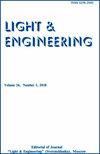从光的历史和20世纪20 - 30年代苏联住宅建筑中自然采光的工程问题
IF 0.3
4区 工程技术
Q4 ENGINEERING, ELECTRICAL & ELECTRONIC
引用次数: 0
摘要
确保住宅正常的自然照度和充足的日照是当今世界迫切需要解决的问题。住宅照度和居住区日照的主要规定和要求是在20世纪前几十年国内实践中制定的。本文认为,苏联在20世纪20年代下半叶至30年代初,随着市政建设和合作社建设的发展,对计算方法的探索得到了集中的开展。国家的工业化进程,与占主导地位的工业发展利益相联系,影响了光与工程等科学分支的迅速形成。住宅建筑作为一种特定的“家庭生产”的方法,引起了建筑师和灯光工程师对选择最佳形状和窗户开口面积的兴趣。自20世纪30年代中期以来,人们开始关注土木工程的艺术方面和“遗产的发展”,这导致了在不同照明条件下对复杂建筑形式的特殊感知领域的工作,这有时会损害住宅场地照明的设计。20世纪30年代末,随着标准工程增加住房建设量的任务,重新开始研究在考虑朝向和各种遮阳因素的情况下确定窗户开口的最佳形状、面积和位置。在此期间,日照问题与住宅建筑直接相关(让我们记住勒·柯布西耶和雅典宪章)。在实验室检查和现场试验的基础上,建立了生活区日照系数值,确定了生活区日照的基本要求。然而,今天,当到处都在呼吁形成一个可持续的生活环境、有意识地处理资源消耗和改善人民的生活质量时,不幸的是,80年前科学证明的规定正在国内实践中被修改,走向明显的恶化。本文章由计算机程序翻译,如有差异,请以英文原文为准。
From the History of Light and Engineering Issues of Natural Lighting in the Soviet Residential Architecture of the 1920s-1930s
Ensuring normal natural illuminance of dwellings and their sufficient insolation is today an urgent problem around the world. The main provisions and requirements for illuminance of dwellings and insolation of residential areas were formulated in domestic practice in the first decades of the twentieth century. The paper shows that the search for calculation methods was intensively carried out in the Soviet Union in the second half of the 1920s – early 1930s, with the development of both municipal and cooperative construction. The course towards the country’s industrialization, associated with the dominating industrial development interests, influenced the rapid formation of such a branch of science as light and engineering. The approach to housing construction as a specific “household production” has led to the interest of architects and light engineers in the selection of the optimal shape and area of window openings. Drawing attention to the artistic aspects of civil engineering and the “development of heritage” since the mid 1930s led to work in the field of the particular perception of complex architectural forms under different lighting conditions, which sometimes was to the detriment of designing the residential premise illuminance. At the end of the 1930s, along with the tasks of increasing the volume of housing construction according to standard projects, research was resumed to determine the optimal shape, area and location of window openings, taking into account the orientation and various shading factors. During this period, insolation issues were directly associated with housing architecture (let’s remember Le Corbusier and the Athens Charter). On the basis of laboratory examinations and field experiments, daylight coefficient values for living quarters were established and the basic requirements for insolation were determined. However, today, when calls are heard everywhere for the formation of a sustainable living environment, a conscious approach to resource consumption, and an improvement in the quality of life of the population, the provisions scientifically proven 80 years ago, unfortunately, are being revised in domestic practice towards their clear deterioration.
求助全文
通过发布文献求助,成功后即可免费获取论文全文。
去求助
来源期刊

Light & Engineering
ENGINEERING, ELECTRICAL & ELECTRONIC-OPTICS
CiteScore
1.00
自引率
50.00%
发文量
0
审稿时长
1 months
期刊介绍:
Our magazine
develops comprehensive communication within the lighting community, providing opportunities for discussion and free expression of opinions of specialists of different profiles;
contributes to the convergence of science and engineering practice, the search for opportunities for the application of research results in lighting and technological applications of light;
keeps the scientific community up to date with the latest advances in the theory of the light field, providing readers with operational professional information;
initiates international cooperation, promotes and distributes the results of Russian authors in the international professional community;
provides equal opportunities for authors from different regions of Russia and other countries.
The journal publishes articles in the following areas:
visual and non-visual effects of radiation on humans;
light field theory;
photometry and colorimetry;
sources of light;
ballasts;
light devices, their design and production technology;
lighting and irradiation installation;
light signaling;
methods of mathematical modeling of light devices and installations;
problems of energy saving in lighting, installation and operation of lighting installations;
modern production technologies of lighting products for lighting control systems;
innovative design solutions;
innovations in lighting and lighting design;
the study of the effect on plants and animals, problems of using light in medicine;
problems of disinfection of premises, water and smell elimination with the help of technology of UV radiation using;
problems of light in the ocean and space.
 求助内容:
求助内容: 应助结果提醒方式:
应助结果提醒方式:


